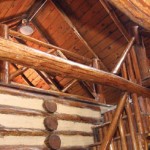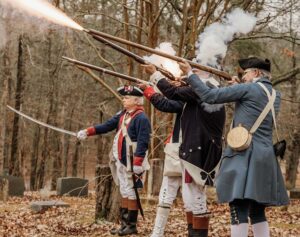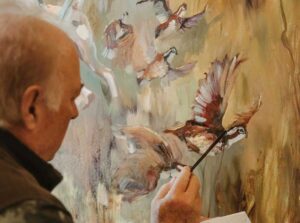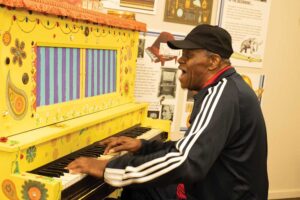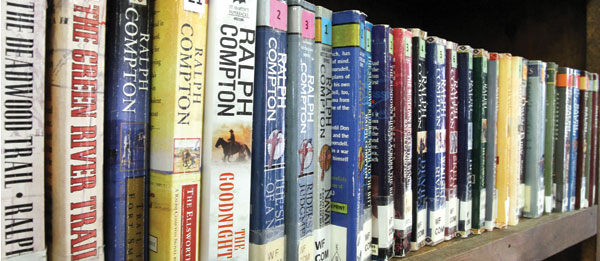
Western Author, Odenville Icon
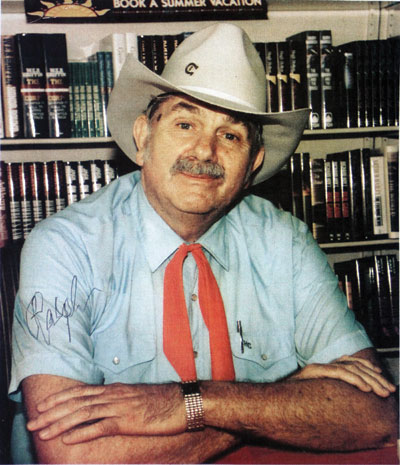 Story by Carol Pappas
Story by Carol Pappas
Photos by Jerry Martin
It was a simple question, really: “Can you write a western?”
The reply was equally without complexities: “I said I didn’t know, but I’d like to try.”
And beginning at age 56, Ralph Compton did indeed write a Western — 23 of them in just eight years — and is mentioned in the same breath with the likes of Louis L’Amour, Zane Grey and Larry McMurtry.
But this story didn’t begin with the birth of an author, it began with the birth of a baby boy in a little log home with a dirt floor. “You walked three miles along the Seaboard Railroad track, climbed a cut bank and trudged another three miles through the woods,” he wrote in his autobiography.
Townfolks and passersby on US 411 who see the sign that reads, “Home of Ralph Compton,” know the destination point of that long ago six-mile trek — Odenville, Alabama.
Born April 11, 1934, Compton says he missed the worst of the depression. “We were in the midst of one of our own when the rest of the country caught up to us. It seemed like we all started poor and went downhill from there,” he wrote.
His mother had a sixth grade education; his father, fifth grade. “By the time FDR’s ‘team of mules, seed and fertilizer’ stake got to us, there were no mules.” His father secured a team of oxen, seed and fertilizer and planted a crop. “In his best year, he made almost enough to repay what he owed the government.”
Compton grew up on Hannah Mountain near Lynch Lake and graduated from St. Clair County High School in Odenville, no small feat for the boy with less than meager means. “In those days, ‘welfare’ families were not looked on with favor,” he said. “There were four of us, and we received the staggering sum of $39 a month. I owe my high school graduation to understanding teachers who provided odd jobs so that I had the bare necessities.”
He singled out his high school principal, Nancy Wilson, who encouraged him not only to read, but to remember what he read. “Because I did read, she moved me ahead, encouraging me to read literature and history more advanced than my grade required. Before my graduation, I knew I wanted to write, although I wasn’t sure what.”
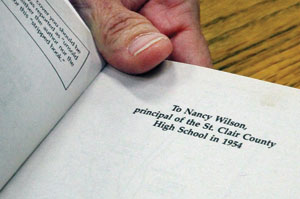 It would be more than three decades before he settled that question. The Goodnight Trail launched his western novels career, selling more than 1 million copies upon its release. The book’s dedication was to the spark that ignited his passion for literature. “To Nancy Wilson, principal of the St. Clair County High School in 1954,” it says.
It would be more than three decades before he settled that question. The Goodnight Trail launched his western novels career, selling more than 1 million copies upon its release. The book’s dedication was to the spark that ignited his passion for literature. “To Nancy Wilson, principal of the St. Clair County High School in 1954,” it says.
Ten more “trail series” books would follow, along with a dozen other western novels. Six Guns and Double Eagles, The California Trail and the Shawnee Trail were in the top 50 most requested western novels the year before he died, according to a Birmingham News story on his death in 1998. The story quotes his brother, Bill, who talked of his songwriting days in Nashville. “He played guitar and liked bluegrass music.”
In his autobiography, Compton writes about Bill. After serving in the Army during the Korean War, Compton said he returned home to find his brother “an accomplished guitarist and singer, and the two of us set out to make big tracks.”
They played legion halls, armories, schools and radio stations. “Most little stations provided time for free on Saturday afternoon, usually 15 to 30 minutes for those enthusiastic enough (or dumb enough) to donate their ‘talent’ for the exposure,” Compton recalled. One time they were on three stations — live — and they raced from one station to the other just for the chance to play.
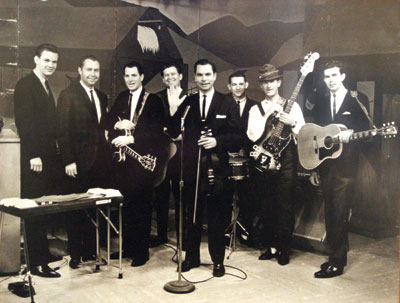
They split up in 1960, and Bill went on to play with Country Boy Eddie, a popular television show in Birmingham and in Alabama. Ralph headed north to Nashville with hopes of becoming a songwriter.
“Nashville wasted no time in giving me a hard way to go.” He and a friend eventually started a tabloid magazine, The Rhinestone Rooster. “We went broke, were able to borrow some additional money, and went broke again,” he wrote.
But he saved the logo and used it as a record label in producing recording sessions with limited success. He moved from one odd job to another before finally calling an end to his songwriting career. He had begun a novel in 1989 on a subject he knew all too well — growing up in the south during the Depression.
When he showed it to a literary agent, he acknowledged he had potential and said, “I like it, but I can’t sell it. Can you write a western?”
And that single, simple question launched a stellar career as a bestselling novelist with St. Martin’s Press and Signet Publishers, his historical accuracy becoming his trademark.
He passed away at age 64 of cancer. But his works and his words are his legacy. In his hometown of Odenville the pride of what he accomplished runs a little deeper. A display case at the library features his cowboy boots and a cowboy hat he donated. Nearby are rows and rows of his books, the most popular western author by far at his hometown library, Librarian Betty Corley says. “L’Amour is very famous, very well known, but they still get Compton.”
Outside, the library’s western themed sign, too, proclaims his roots. Perhaps it is because his own story is as inspiring as his westerns are captivating. From dirt floor beginnings to bestselling author certainly has the makings of a story to be told and retold.
In a 1993 issue of The Roundup for Western Writers of America, he recounted the question that changed his life. “Can you write a western? I could, and thank God, I did. My one regret is that I lacked the confidence and courage to do it sooner.
“While the Old West lives only in the pages of history, I believe there’s something within each of us that longs for those days when there was yet another frontier to be conquered, another mountain to cross, and the thrill of the unknown. I believe the Old West will live forever — perhaps not in Hollywood, but in the hearts and minds of men and women who refuse to let it die.”
And the memory of Ralph Compton lives on in the town proud to call him its native son.











